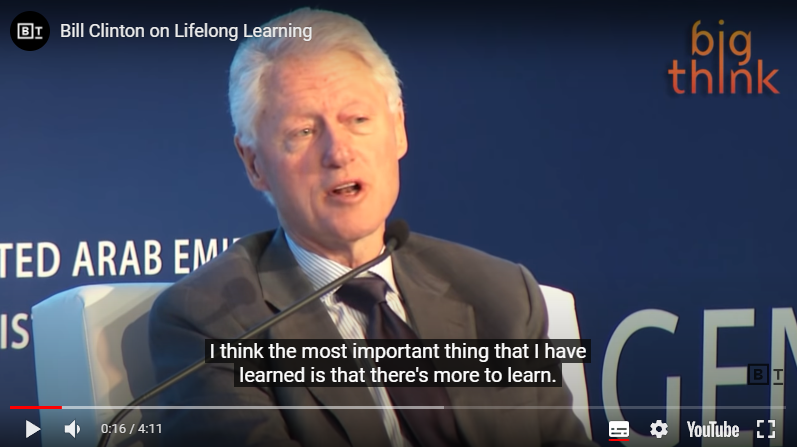Share
“I think the most important thing I’ve learned is that there’s more to learn”. Now, isn’t that the truth? Bill Clinton shared the above nugget of wisdom in a 2014 interview and I thought it was worth a mention here.

It beautifully sums up lifelong learning, a concept that is now gaining traction in the L&D spaces in our workplaces. But why is it relevant to businesses? I can imagine some managers are asking that; they want to make sure their employees are trained for their roles, yes, but surely that’s just classed as workplace learning? Why should they be bothered about encouraging lifelong learning as a whole?
I understand these questions – I asked them myself – which is why I wanted to delve into the topic, and I’m so glad I did. Hopefully by the end of this article, I’ll have shed some light on why lifelong learning is relevant to the workplace and how it can help your organisation thrive.
But to do this, it’s useful to see the bigger picture, so I’m going to explore what it is, how it benefits the learner, and, as a result, the workplace. Because, as with most things, it’s all connected.
What is lifelong learning?
Essentially, it’s learning that continues beyond what we’d class as ‘formal’ education, such as school, college, or university. It can take the shape of a qualification or anything that results in a certificate (such as e-learning), or it can be as simple as learning through materials such as webinars, how-to videos, podcasts or books. Anything you can consume that will allow you to learn more about a subject.
Lifelong learning is also a mindset. It goes hand in hand with a desire to learn, a thirst for knowledge
But I’ve come to the conclusion that lifelong learning is also a mindset. It goes hand in hand with a desire to learn, a thirst for knowledge. And though there can be many different motivations behind it – wanting to advance a career, quickly learn how to do something, or simply learn about a topic of interest – that desire to learn is always there.
It has to be because it’s largely self-motivated. With little to no external drivers encouraging the learner on, desire and drive to learn are the only ways to succeed. (Which can be a nightmare when they come up against inevitable challenges, difficulties or failures – but more on that later.)
The benefits for the learner
Aside from the obvious benefit – an increase in knowledge about topics or skills – lifelong learning has many other, subtler benefits for the learner as well.
In a nutshell, it enhances their mind, wellbeing, confidence and livelihood. And in this wonderful TED Talk, Gitanjali JB, who is a huge advocate for lifelong learning, illustrates this point beautifully.
She talks about how her exploration of different skills (learning a new language, ballet and martial arts) helped her learn more easily and faster, as her brain was benefitting from dealing with different challenges and topics. She also describes how it helped her develop creative thinking and ideas, as well as spot new connections between topics she had failed to see before. These helped her apply what she had learnt in one topic to seemingly unrelated challenges in her daily work life. She revealed that through this, her confidence in herself and her abilities increased and her overall wellbeing benefited, as her life was enriched from all she had gained from being a lifelong learner.
Returning back to Bill Clinton’s talk, he revealed research that highlighted the positive impact that learning new skills has on adult’s brains. He explains that it’s now apparent that people well into their 60s and 70s – a time in which we’ve previously believed the brain was starting to deteriorate – can still form new neuropathways, but they’re most likely to form if we learn something new.
Always ‘being hungry for more’
And though your team is unlikely to be in their 60s and 70s, isn’t it best to encourage this type of mindset now? Get them to understand the benefits of always learning, of always ‘being hungry for more’, as Clinton says, and get them forming new neuropathways? It’s worthwhile because, as you’re about to find out, it won’t only benefit them, it’ll benefit the organisation too.
Why managers should encourage lifelong learning
First of all, which organisations wouldn’t want an employee with the benefits listed above? Ones that have creative ideas and solutions, that have a range of skills at their fingertips? They’d be an asset to any business.
So, yes, there is a clear benefit to businesses: the type of employees it develops. But also, just by encouraging them to develop a lifelong learning mindset, you’re helping the business in other ways.
Research shows that employees value their workplace if they feel that it is invested in their development. They’ll feel respected, and it’ll improve their confidence and wellbeing at work. And, as a result, it’ll increase their feelings of loyalty toward their employer. They’ll want to stay, want to help advance the business further.
Doesn’t that sound like a great place to work? One where employees feel respected and can share their creative ideas and solutions? So, why not start the lifelong learning in the workplace? Make learning an integral part of your business strategy, and get your employees excited about it.
Advice to share with your team
There are numerous ways to encourage your team to become lifelong learners – everything from developing an effective learner journey, to purchasing exciting learning ecosystems to draw your learners in, or developing shared team goals in learning – but it also isn’t as simple as that. It’s a topic that will need discussing and returning to, especially as the learners move along their learning journey.

Here are some things to remember, which might be worth sharing with your team.
Learning takes time
It isn’t a one-time thing, it’s a process. To build and strengthen the neuropathways, we need to keep returning to what we’ve learnt. Put it into practice, re-read the book, or the notes we made. Talk about it. We’re never going to read a book once or take a course once and retain it all, so we need to make time to embed it. It’s why we talk so much about learner journeys in the L&D industry. Because that is what learning is – a journey.
You may have heard of Malcolm Gladwell’s ‘It takes 10,000 hours to master a skill’.
And though it’s a lot more complex than just taking 10,000 hours, part of the point he is making is that learning takes time. A lot of time. More time than you think. So, it’s always worth keeping that in mind, or reminding your team of that if they’re trying to master something, so that they don’t give up. So that they can work through the inevitable mistakes and find a way to flourish.
Lifelong learning and deliberate practice
Sticking with Malcolm Gladwell, he also believes that that time you spend mastering your skill must include deliberate practice. He defines this as a focused style of learning, one that concentrates on the areas that need improving, and one that also includes ample feedback. His research says that those who undertake this style of practice see more improvement than those who don’t.
So, though this feedback doesn’t have to be external, it can be reflections from the learner, as a manager you may have a role there. Is there feedback you can give them on any skills they’re learning? Can you help identify the areas that they can focus on to improve?
Lifelong learning and growth mindset
Whilst learning, we might not grasp something straightaway, or we might misunderstand, or make a mistake – it’s all part of it. And when we’re doing self-motivated learning, this can be disheartening. But it’s worthwhile persevering and getting through to the other side.
This is where a growth mindset comes in. Carol Dweck made waves when she talked about what she called ‘growth’ and ‘fixed’ mindsets in young school children.
Children with a growth mindset enjoyed challenges, looked for way to improve, understood that their abilities could be developed. Whereas those who had a more fixed mindsets found it tragic and catastrophic when they couldn’t easily answer or solve a problem, and wanted to cheat, run and do anything to quickly avoid the horror.
A learner has to have the ability to pick themselves up again and keep trying.
As any learning naturally includes making mistakes or ‘failing’, a learner has to have the ability to pick themselves up again and keep trying. Engage with their struggles, errors and process what has happened, learn and correct it. They need a growth mindset.
This is especially important when it comes to lifelong learning – again, because it’s self-motivated. A lifelong learner won’t necessarily have a teacher or professor encouraging them to keep going, just their own drive and desire to learn a new skill, theory, idea. Luckily these mindsets can change – so if any of your team feels they naturally have a more ‘fixed mindset’, don’t let them use that to hold them back – encourage them to work on changing it. Help them if you can!
Take a small step: Learn together
If you’re convinced enough to introduce lifelong learning to your team and you’re looking for a place to begin, why not start with a small step? Choose something for the team to learn together. Or encourage them to choose separate topics that you can then come together to share, so you can learn from one another. This act of sharing can help increase motivation, especially when things get tough, as there is a sense of responsibility to bring something to the group. Plus, it gives you an opportunity to talk through challenges together and help one another.
They don’t have to be big skills either, it might be reviewing time management skills, or working on improving their presentations, or it might be something meatier like learning a new area of animation. Whatever works for your team! So, I recommend booking in training hours in your diaries and then an afternoon ‘sharing’ slot, in which you come together and talk about what you’ve learnt. What are you waiting for? Advocate learning, and lead the way.
Share
